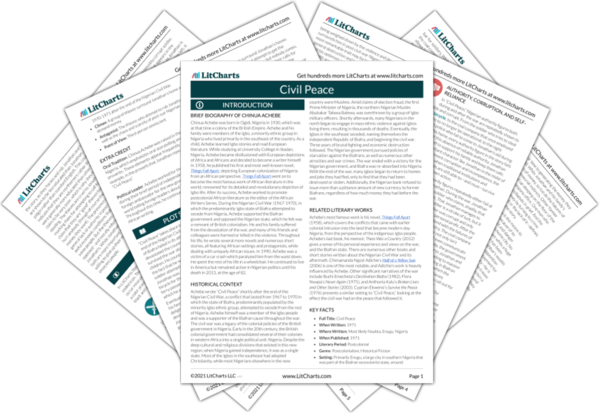Jonathan’s bicycle is representative of his intelligence and work ethic, as well as the faith which continues to help him through his struggles in the aftermath of the war. During the war, Jonathan almost loses the bicycle when a possibly corrupt Biafran army officer tries to requisition it. But Jonathan holds onto the bike by bribing the officer and then realizes that the only way he can ensure he can keep the bike is to hide it until the war ends. He buries the bike, in the same graveyard where his youngest child who died in the war is buried.
When he digs up the bike after the war and finds it is still usable, the moment is a kind of resurrection that attests to the power of God as well as to Jonathan’s own ingenuity, and which also offers hope for Jonathan’s prospects in the post-war world. In that post-war world, the bicycle repeatedly enables Jonathan to grasp opportunities for work and survival. He first uses it as a taxi in his refugee camp, and later as his means of transportation to purchase palm wine for his bar. The bicycle functions as a tool that amplifies Jonathan’s own drive and ingenuity, and in doing so it both highlights the necessity of that drive and ingenuity for success in post-Civil-War Nigeria while also emphasizing how luck and God’s blessings—in the form of the bicycle’s survival through the war, also play a key role in success.
The Bicycle Quotes in Civil Peace
He had come out of the war with five inestimable blessings— his head, his wife Maria’s head and the heads of three out of their four children. As a bonus he also had his old bicycle— a miracle too but naturally not to be compared to the safety of five human heads.

Unlock explanations and citation info for this and every other Civil Peace quote.
Plus so much more...
Get LitCharts A+It wasn’t his disreputable rags, nor the toes peeping out of one blue and one brown canvas shoes, nor yet the two stars of his rank done obviously in a hurry in biro, that troubled Jonathan; many good and heroic soldiers looked the same or worse. It was rather a certain lack of grip and firmness in his manner.
That night he buried it in the little clearing in the bush where the dead of the camp, including his own youngest son, were buried. When he dug it up again a year later after the surrender all it needed was a little palm-oil greasing. “Nothing puzzles God,” he said in wonder.
His children picked mangoes near the military cemetery and sold them to soldiers’ wives for a few pennies— real pennies this time— and his wife started making breakfast akara balls for neighbours in a hurry to start life again. With his family earnings he took his bicycle to the villages around and bought fresh palmwine which he mixed generously in his rooms with the water which had recently started running again in the public tap down the road, and opened up a bar for soldiers and other lucky people with good money.












